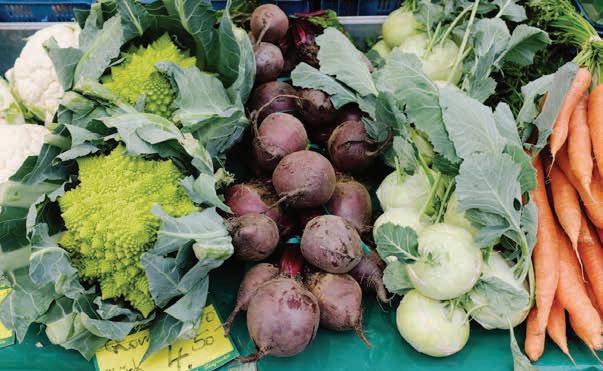
3 minute read
Why Farm-to-Table Not Only Benefits the Consumer but the Environment As Well

Article by Aya Furin-Campbell
Advertisement
Farm-to-table is the process of consumers buying locally grown products from farms or community farmer’s markets as opposed to mass-produced or factory-farmed products at grocery stores, and it has many health and environmental benefits. Heavily processed foods have far less nutritional value than locally grown foods. Genetic modifications, extensive travel time and distances, chemicals, and hormones have negative impacts on both the health of the consumer and the environment. This is because it takes so much energy and pollution to bring these products to us while simultaneously damaging them and the Earth, making the entire system far less sustainable.
The Centers for Disease Control and Prevention states that the benefits of eating healthy include but are not limited to a longer and improved lifestyle, lower risk of disease and diabetes, and increased health of the bones, muscles, and skin. The best way to eat healthier is by eating farm-to-table because it is then guaranteed that you know what you’re consuming.
Keyrel Williams is a Food Hub Assistant at Dreaming Out Loud, a farm dedicated to promoting a healthier more accessible system of food production for communities in DC that may not otherwise have access to these luxuries.
“Food grown locally is typically more nutritious and people can feel satisfied that when they purchase locally they are not only helping the environment but also their community,” Williams said, “There was a study done that showed that food travels almost 1,000 miles before it is eaten. That burns a lot of fuel when you can get better produce a few blocks away at less cost to the environment. In addition, almost 40 percent of produce is shipped from outside the United States. To keep it from spoiling on its long trip some food is picked before it can fully absorb all of the nutrients.”
Unfortunately, a farm-to-table diet is not as accessible as it should be. Food insecurity is already a huge problem in this country, and those who do not suffer from food insecurity still may not have access to local farms, farmer’s markets, or homegrown products. Mass-produced food and fast food are cheaper and more accessible, yet do not come with the benefits that locallygrown food does. This is why nonprofit organizations such as dreaming out loud are so beneficial to their surrounding communities. Everyone should have the privilege of choosing a farm-to-table diet, but those who have the option and choose not to may be missing out.
“It is more expensive, there is no denying that. But small local farms prioritize quality over quantity and can’t replicate the lower production costs of massive corporations,” Williams said, “Take that and add in the environmental and economical angle and I believe that the increased cost is worth it.”


The recent rise in the cost of eggs has made the prices extremely comparable to locally grown farmer’s market eggs. This simple switch not only supports local farmers as opposed to large corporations that farm their chickens under horrible conditions, but also provides the consumer with eggs that have a longer shelf life, are not coated in chemicals, and are overall healthier.
Beverly Eggleston is the president and founder of Eco-Friendly foods, and works promoting a farm-to-table diet. He highly recommends locally grown eggs and stresses the differences between farm eggs and commercial eggs. “This new, or as I call it, insane model of production isn’t thinking about your nutrition isn’t thinking about your exposure isn’t thinking about your health,” he said, “They’re thinking about margin and volume and profit, and because of that they’re never gonna have the quality we have.”
Eggs at the Eco-Friendly Foods Farmer’s Market Stand. If you are new to the farm-totable lifestyle and don’t know where to start, there are plenty of great healthy recipes to kickstart the process! Shakshouka is one of them, recommended by staff members of Dreaming Out Loud. This comforting Tunisian dish is made by sauteing garlic, onions, and peppers in olive oil or any cooking oil of your choice until they form a sauce. Then add fresh tomatoes, herbs, salt, pepper, cumin, chile pepper, and paprika, and let that cook. Next, make space in the mixture to crack in locally grown eggs and either cook them while covered in the same pan, or in the oven. It doesn’t take long, and incorporates farm-to-table ingredients, making for a healthy and well-balanced meal!




Po’boy Sandwiches are our specialty. We got all kinds of Po’boys like the classic shrimp, grouper, catfish, oysters and chicken Po’boy.


We also have Chicken boxes, salmon, catfish and grouper dinners. Our desserts, Bourbon Pecan Pie and White Chocolate Chip Milk Cake will blow your socks













